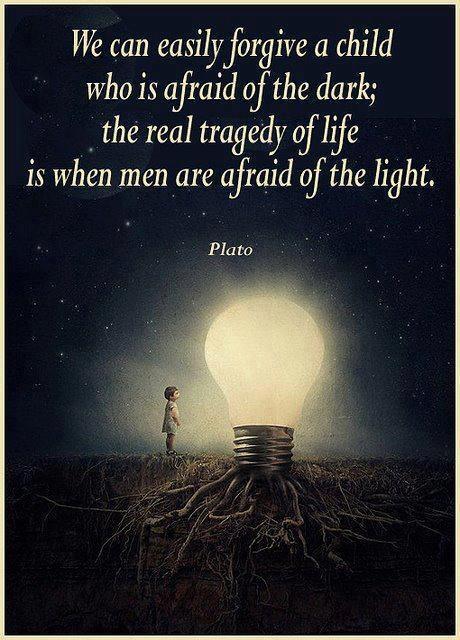We can forgive a child who is afraid of the dark; the real tragedy of life is when men are afraid of the light

We can forgive a child who is afraid of the dark; the real tragedy of life is when men are afraid of the light
Plato, the ancient Greek philosopher, is known for his profound insights into human nature and the nature of reality. One of his most famous allegories, the Allegory of the Cave, explores the idea of enlightenment and the fear that comes with it. In this allegory, Plato describes a group of prisoners who have been chained in a cave their whole lives, facing a wall where shadows are projected from a fire behind them. These prisoners believe that the shadows are the only reality they know, until one of them is freed and sees the outside world for the first time.The quote “We can forgive a child who is afraid of the dark; the real tragedy of life is when men are afraid of the light” can be seen as a reflection of Plato’s ideas in the Allegory of the Cave. In this context, the darkness represents ignorance and the shadows on the wall represent the illusions that people believe to be true. The child who is afraid of the dark can be forgiven because they are simply afraid of the unknown, of what lies beyond their limited understanding. However, the real tragedy occurs when men are afraid of the light, when they are afraid to seek knowledge and enlightenment.
Plato believed that true knowledge and enlightenment could only be achieved through philosophical inquiry and the pursuit of truth. He saw ignorance as the root of all evil and believed that it was the duty of every individual to seek out the light of knowledge and understanding. In the Allegory of the Cave, the freed prisoner represents the philosopher who has seen the light of truth and is now faced with the challenge of returning to the cave to enlighten the other prisoners.
The fear of the light, in Plato’s view, is a fear of the unknown, a fear of challenging one’s beliefs and stepping out of one’s comfort zone. It is a fear of facing the harsh realities of the world and the uncomfortable truths that come with enlightenment. However, Plato believed that only by facing these fears and seeking out the light of truth could individuals truly free themselves from the chains of ignorance and illusion.












 Friendship Quotes
Friendship Quotes Love Quotes
Love Quotes Life Quotes
Life Quotes Funny Quotes
Funny Quotes Motivational Quotes
Motivational Quotes Inspirational Quotes
Inspirational Quotes